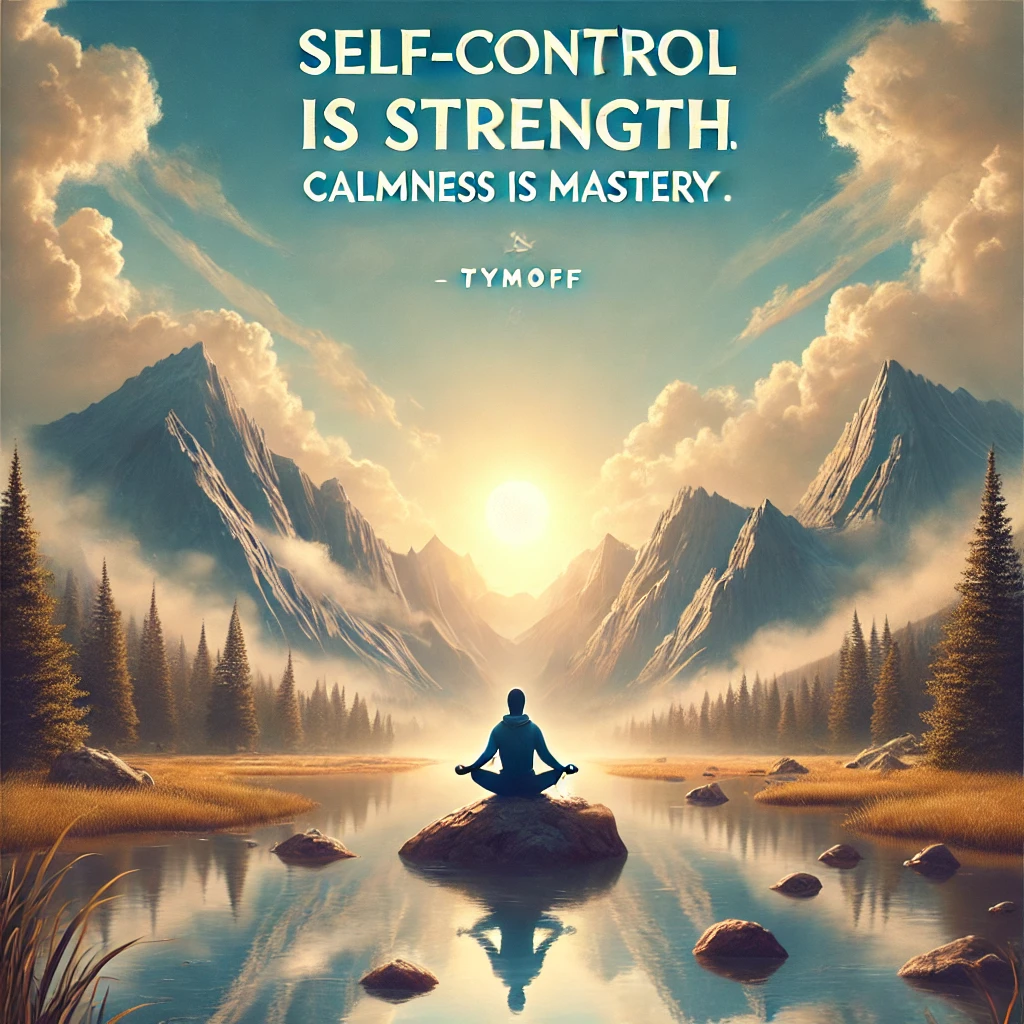
Introduction
In today’s fast-paced world, cultivating self-control and calmness has become more important than ever. Mastering these traits can lead to profound personal growth and success, allowing us to thrive even amid chaos. As the saying goes, “self-control is strength. calmness is mastery. you – tymoff,” these two qualities are essential for anyone who wants to live a fulfilled and meaningful life. In this article, we will explore what self-control and calmness mean, why they are vital, the challenges of mastering them, and practical ways to achieve them. We’ll also discuss how they can transform different aspects of our lives and provide insights backed by science.
What Is Self-Control?
Self-control is the ability to regulate one’s emotions, thoughts, and behaviors to achieve specific goals. It’s not about denying our desires or avoiding pleasures; rather, it’s about making conscious decisions that align with our long-term aspirations. Self-control means being able to resist instant gratification in favor of achieving something more meaningful down the line.
At its core, self-control is about being in charge of our emotions and actions, rather than letting external circumstances dictate how we react. It’s what allows us to stay focused on our goals, overcome temptations, and make decisions that are best for our well-being.
Why Self-Control Is Strength
Self-control is often regarded as a powerful trait because it gives us the strength to act in our own best interests, even when faced with challenges or temptations. Here are 10 reasons why self-control is strength:
- Teaches Patience: Self-control helps us develop patience, which is crucial for handling challenging situations. By exercising self-control, we become more composed and can make better decisions.
- Control Over Emotions and Desires: Those who learn to control their emotions become internally stronger. They can use their emotions as a source of strength during tough times, instead of letting them overpower them.
- Improved Focus: Self-control enhances our ability to concentrate on our goals by eliminating distractions. This increased focus helps us make logical decisions and prioritize important matters.
- Prioritization: Self-control helps us prioritize what truly matters. It allows us to use our mind rather than our emotions when deciding what deserves our time and energy.
- Calculated Decision-Making: With self-control, our decision-making becomes more analytical and less emotionally driven. We learn to consider situations from multiple angles, leading to better outcomes.
- Handles Stress: Self-control helps us manage stress effectively. By staying composed during difficult situations, we can think rationally and avoid making impulsive decisions.
- Non-Greedy Attitude: Self-discipline allows us to manage our desires, avoiding greed and attachment to unnecessary things. This simplicity brings a sense of peace and contentment.
- Improved Health and Well-Being: Exercising self-control has a positive impact on mental health, reducing stress levels and contributing to overall emotional stability.
- Manage Challenging Situations: Self-control helps us navigate difficult situations with a clear mind. It ensures that we don’t let emotions cloud our judgment.
- Self-Regulation: Self-control teaches us that both joy and sorrow are temporary, and it’s important to stay focused on our long-term goals rather than getting caught up in temporary emotions.
What Is Calmness?
Calmness is the ability to stay composed and maintain inner peace, even in the face of challenges or uncertainty. It is about not letting external events disturb our mental balance. Calmness is mastery, as it allows us to respond to situations thoughtfully rather than react impulsively.
Calmness is a sign of true strength because it reflects the ability to stay focused and maintain clarity when everything around us is chaotic. It gives us the power to handle stress and overcome adversity without letting anxiety take over.
Why Calmness Is Mastery
Mastering calmness is essential for maintaining emotional stability and navigating through life’s ups and downs. Here’s why calmness is mastery:
- Maintains Clarity of Thought: When we are calm, we can think clearly and make better decisions. It prevents us from being overwhelmed by negative emotions and allows us to find solutions.
- Reduces Stress and Anxiety: Calmness helps us manage stress and anxiety effectively. It keeps us grounded, even in tough situations.
- Improves Relationships: Staying calm helps us communicate better and build stronger relationships. It prevents us from reacting harshly and allows us to respond with empathy.
- Boosts Problem-Solving Skills: When we are calm, we can think more creatively and come up with effective solutions to problems. It enhances our ability to approach challenges with a positive mindset.
- Fosters Emotional Intelligence: Calmness is integral to developing emotional intelligence. It enables us to understand our emotions and those of others better, leading to more effective communication and connection.
Self-Control is Strength. Calmness is Mastery. You – Tymoff in Everyday Life
The phrase “self-control is strength. calmness is mastery. you – tymoff” encapsulates the essence of living a balanced life. Embracing these principles can transform how we interact with the world. For instance, individuals who practice self-control often find themselves making healthier lifestyle choices. By resisting the temptation of unhealthy foods or procrastination, they pave the way for long-term well-being. This strength allows them to set and achieve personal goals, fostering a sense of accomplishment.
Furthermore, calmness plays a crucial role in our interactions with others. In high-pressure situations, maintaining a calm demeanor can diffuse tension and foster better communication. For example, a manager who approaches conflict with a calm mindset is more likely to resolve issues effectively than one who reacts emotionally. This mastery not only enhances workplace relationships but also contributes to a positive organizational culture.
Integrating the mantra “self-control is strength. calmness is mastery. you – tymoff” into daily routines can also enhance resilience. Life’s challenges often come unexpectedly, and those equipped with self-control can navigate these storms more effectively. They are less likely to be swayed by momentary setbacks and can maintain focus on their long-term vision, leading to greater success in both personal and professional realms.
Moreover, self-reflection is key to cultivating these qualities. Regularly assessing one’s thoughts and behaviors can illuminate areas where improvement is needed. Journaling or meditation practices that emphasize self-control and calmness help reinforce these traits, making them more instinctual over time. This ongoing practice creates a feedback loop where increased self-awareness leads to better decision-making and emotional regulation.
Ultimately, adopting the philosophy of “self-control is strength. calmness is mastery. you – tymoff” empowers individuals to take charge of their lives. It serves as a reminder that true mastery comes from within. By focusing on these attributes, we can cultivate a sense of peace and purpose, enabling us to thrive even in the most chaotic circumstances.
Scientific Evidence for Self-Control and Calmness
Scientific research supports the idea that self-control and calmness are crucial for our overall well-being. Studies have shown that practicing self-control can lead to better mental health, improved physical health, and greater life satisfaction. Meditation, mindfulness, and other practices that promote calmness have been found to reduce stress, lower blood pressure, and improve emotional regulation.
A study published in the Journal of Personality and Social Psychology found that individuals with higher self-control tend to be happier and more successful in their personal and professional lives. Another study in the Journal of Neuroscience revealed that mindfulness practices, which promote calmness, can lead to changes in the brain that enhance emotional regulation and reduce anxiety.
Real-Life Examples of Mastering Self-Control and Calmness
To better understand the power of self-control and calmness, let’s look at some real-life examples:
- Nelson Mandela: Mandela’s life is a testament to the power of self-control and calmness. Despite being imprisoned for 27 years, he remained composed and focused on his goal of ending apartheid in South Africa. His calm demeanor and self-control helped him lead his country to freedom.
- Serena Williams: The tennis legend has often spoken about the importance of self-control in her career. Her ability to stay focused and calm under pressure has been key to her success on the court.
Challenges of Practicing Self-Control and Calmness
While self-control and calmness are powerful traits, mastering them is not without its challenges. Common obstacles include:
- Instant Gratification: In today’s world, we are surrounded by opportunities for instant gratification, which makes it difficult to exercise self-control.
- Emotional Overload: When emotions run high, it can be challenging to stay calm. Learning to manage emotions effectively is a key aspect of mastering calmness.
- External Stressors: Life is full of unexpected challenges that can test our ability to stay composed. Developing techniques to cope with these stressors is crucial for maintaining calmness.
Practical Techniques to Cultivate Self-Control and Calmness
Here are some practical techniques to help you cultivate self-control and calmness:
- Mindfulness Meditation: Practicing mindfulness meditation helps you stay present and aware of your thoughts without judgment. This practice enhances both self-control and calmness by reducing stress and improving emotional regulation.
- Set Clear Goals: Setting specific, achievable goals helps you stay focused and motivated. Clear goals provide a sense of direction, making it easier to exercise self-control and maintain calmness.
- Emotional Regulation Techniques: Techniques like deep breathing, journaling, and progressive muscle relaxation can help you manage your emotions effectively. These techniques allow you to respond to situations calmly rather than react impulsively.
- Avoid Temptations: Identify the triggers that make it difficult to exercise self-control, and take steps to avoid them. This could involve removing distractions, setting boundaries, or seeking support from others.
- Practice Forgiveness and Letting Go: Holding onto grudges can prevent you from staying calm. Learning to forgive others and let go of negative emotions is essential for achieving mastery in calmness.
- Exercise Regularly: Physical activity is not only good for your body but also for your mind. Regular exercise helps reduce stress, improve mood, and enhance your ability to stay focused and calm.
- Connect with Nature: Spending time in nature can help you feel more grounded and at peace. Whether it’s taking a walk in the park or sitting by a lake, connecting with nature can help you cultivate calmness.
Benefits in Different Areas of Life
Self-control and calmness have far-reaching benefits that impact various aspects of our lives:
- Work: Self-control helps us stay focused on tasks, meet deadlines, and achieve our career goals. Calmness allows us to handle workplace stress and conflicts more effectively.
- Relationships: Practicing self-control and calmness enhances our ability to communicate with others, resolve conflicts, and build stronger connections with family and friends.
- Health: Self-control is linked to healthier habits, such as regular exercise, balanced nutrition, and avoiding harmful behaviors. Calmness helps reduce stress, which is beneficial for both mental and physical health.
- Personal Growth: By cultivating self-control and calmness, we become more resilient, focused, and capable of overcoming challenges. These traits are essential for achieving personal growth and fulfillment.
Conclusion
Self-control is strength. Calmness is mastery. You – Tymoff. These two qualities are essential for leading a fulfilling and meaningful life. Self-control gives us the strength to make decisions that align with our long-term goals, while calmness provides the mastery needed to navigate life’s challenges with grace and composure. By practicing mindfulness, setting clear goals, managing emotions, and connecting with nature, we can cultivate these traits and transform our lives. Remember, the journey to mastering self-control and calmness is ongoing, but with dedication and practice, it is within reach for all of us.




